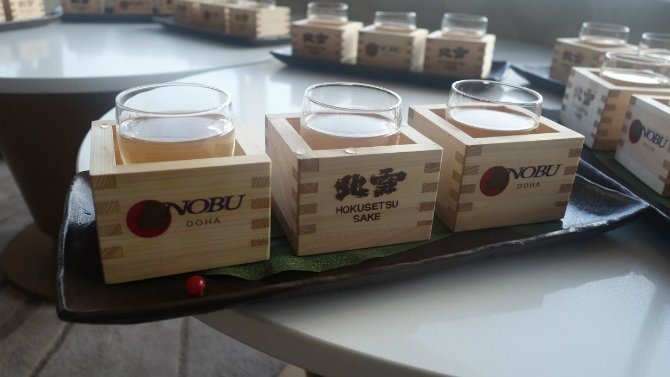Nobu Doha: Nobuyuki Matsuhisa's Unique Vision Is Brought To Life By Chef Andrew Bozoki
Arguably, no man is more important to the international growth of Japanese restaurants than Nobuyuki Matsuhisa. Matsuhisa's skill as an itamae (chef) combined with his business acumen helped bring Japanese cuisine to the far reaches of the globe.
At approximately 26,000-square-feet with space for roughly 420 patrons, the new Nobu restaurant in the Qatari capital of Doha is the demonstrative example of Matsuhisa-san's brand. The first freestanding operation amongst the portfolio of nearly 40 restaurants, the tri-leveled Nobu Doha is worth a visit for the visuals alone. Nobu rests on a man-made island offset from the Four Seasons Hotel, which provides logistical support for the restaurant. It is only a short walk from the hotel to the restaurant, but, as the heat can be unbearable, it is best to take a car. The exterior coils upwards in a crescendo: a winding rooftop patio that offers some impressive panoramas of Doha. You can sit and awe at just how this metropolis has been injected into what is an otherwise barren land; or whip out your cell phone and take a selfie like everyone else.
The restaurant has a 134-seat dining area, a 10-seat sushi counter, and two full service bars with lounges, one black, the other white, identified as the Black Pearl and the White Pearl. Each draws visually on smooth undulations and deep, muted colors. Those with a penchant for connecting the design to its inspiration will appreciate these monikers as a reference to the pearl diving culture that has long been a part of this peninsula's life.
Nobu Doha is a massive operation. The backbone of the kitchen is chef de cuisine Andrew Bozoki and head sushi chef Jephte Tagod, expat chefs who have each been with the restaurant group for at least six years. In order to serve the approximately 300 diners that visit the restaurant on a given night, Nobu Doha employs a battery of 39 chefs and 74 front of the house folks. To sit and watch is entertainment enough. The operation requires constant movement and, at any given time, your head will swivel to catch a glimpse of the staff cherry-picked from the far reaches of our planet.
For anyone who has eaten at any one of the Nobu locations, staples such as such as miso black cod, tempura rock shrimp, and hamachi sashimi with jalapeño will provide a sense of familiarity. As it is with a lot of Japanese cuisine, your best bet is to take a divide and conquer approach to the menu, Nobu's small plate arsenal is designed for sharing, though not everything is demur. If you find yourself placing a large sushi order, expect large trays packed with fresh fish to crowd your table.
It's in the menu's small plates where the creativity of Nobu's unique take on Japanese cuisine is brought to fruition by Bozoki's menu. There are a handful of tartares and ceviches. Toro-grade tuna with crispy rice as well as a slew of tempura options balance the many fish and citrus salads to be found. There are also distinct examples of Nobu's world view with the eight available tacos, including a lobster/wasabi option.
While you'd have better luck finding ice in the Qatari desert than you would an order of pork somewhere in the country, there are plenty of options for those looking to eat meat. Imported Australian Wagyu comes in several forms as does foie gras, that delicious duck liver that begs the question: Is any foie bad foie? Foie gras between two paper thin slices of pumpkin, wagyu nigiri, and grilled chicken wings are just a handful of the meat options to be found.
After a few meals at Nobu Doha, a clear picture begins to emerge: Primarily, that those responsible for the execution of the experience – be it chefs or the servers with whom you will interact – are well-trained, astute students of the Nobu way. It's a well-oiled operation and is every bit as technically warm and proficient as any other Nobu in the world.
Beneath that surface, the shortcomings of the experience point to circumstances beyond the staff's control. In the midst of a worldwide battle for the best ingredients, Doha is not privy to the most delicious of tunas or exotic sea creatures that dot the menus of Tokyo, Paris, and New York City. This is further complicated by the fact that temperatures can reach 115 F degrees in Doha, there aren't a lot of foods grown in those temperatures that fit well inside the Nobu model of Japanese cuisine.
Yet, even in the absence of the world's finest chu-toro, and delicacies like gugu, what's in place at Nobu Doha is an experience worth having. The space is flawless and the food provides local residents a window into Japanese culture while visitors will be able to enjoy the luxury of the brand, the familiarity of the offerings, and the knowledge that eating sushi in such a picturesque dessert setting is one fantastic opportunity.
